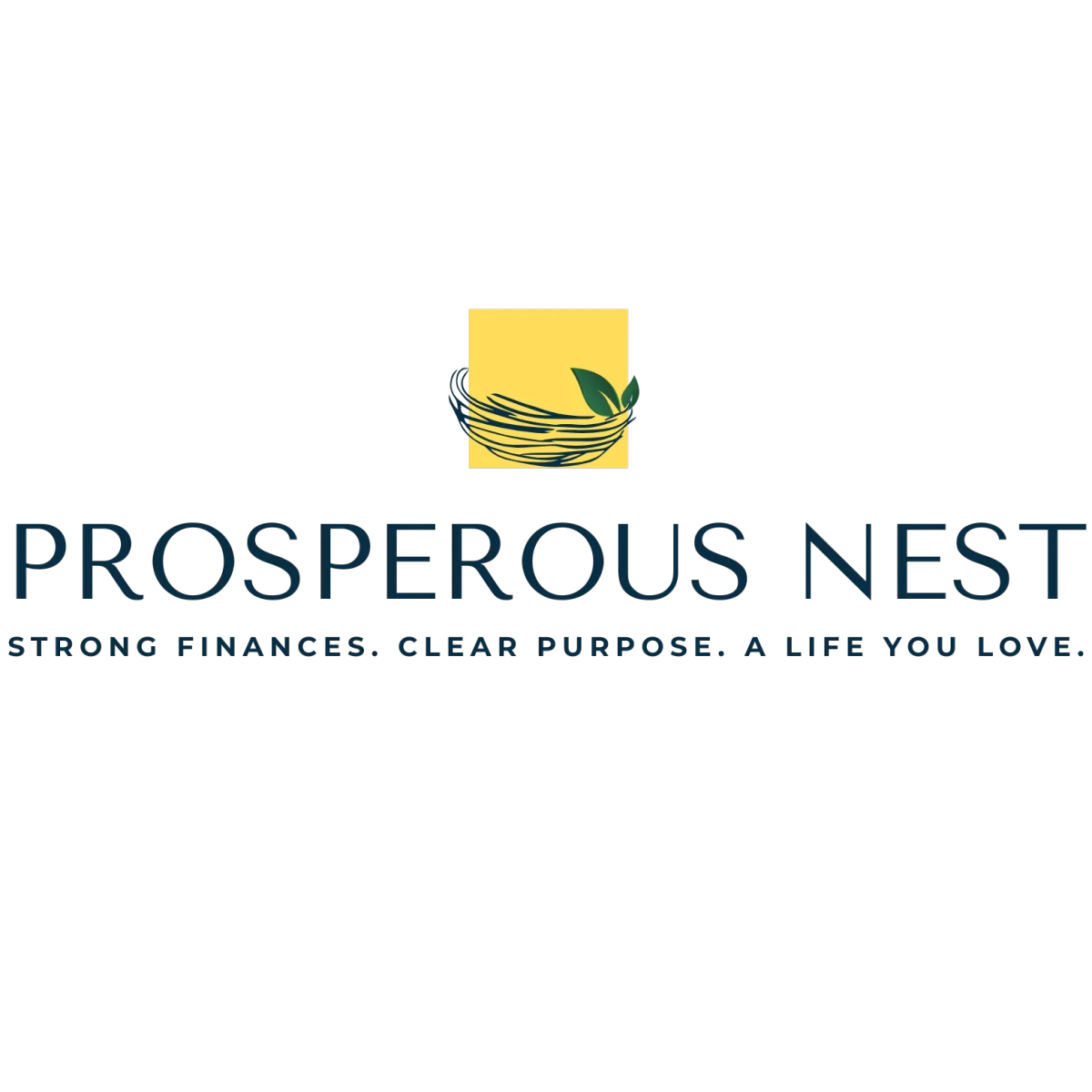
Why Intentionality With Money Feels So Hard (Even When Life Is Stable)
One of the most surprising things I’ve discovered while talking with people about money is this:
Money anxiety isn’t reserved for those who are struggling to make rent.
Some of the people who carry the quietest tension around money are the ones who earn steady incomes and look “stable” from the outside.
They’re responsible, capable, hard-working adults.
They know what’s coming in and have a general sense of what’s going out… and somehow everything works out in the end.
But making the shift from just getting by to planning ahead with intention can feel unexpectedly uncomfortable.
It’s one thing to survive.
It’s another thing entirely to slow down, look closely, and make thoughtful decisions about where your money is going and why.
And while traditional advice often focuses on willpower or rigid budgeting, research shows the real struggle comes from something deeper: your money story, your habits, and the way the brain adapts after seasons of stress or uncertainty. (Sources linked at the bottom.)
In this blog, we’ll explore why intentionality can feel like a struggle, even when life finally feels steady and how to begin shifting into a rhythm that brings clarity, peace, and stability.
My hope is that you walk away feeling understood… grounded in grace… and more confident that you are capable of building a calmer, more aligned relationship with your money.
Table of Contents
Why Stability Doesn’t Automatically Create Peace
How Survival Mode Shapes Your Money Habits
Why Intentionality Can Feel Like Restriction
When “Everything Else” Creates the Most Stress
A Path Forward: How to Shift Into Intentional Living
An Invitation to Take Your Next Step
Sources
Why Stability Doesn’t Automatically Create Peace
When life becomes more stable, steady income, bills covered, emergencies manageable, most people expect their relationship with money to feel peaceful too.
But that’s not always what happens.
For many, survival mode became familiar… even if it was stressful.
It’s a rhythm of reacting, responding, and doing what needs to be done. Exhausting, yes, but predictable in its own way.
When the pressure lifts, your brain doesn’t automatically switch gears.
And that leads into the next piece of the story.
How Survival Mode Shapes Your Money Habits
Survival mode has its own rhythm.
It trains your nervous system to expect urgency, uncertainty, and scarcity, even long after circumstances improve.
Recent research shows that financial stress can shape decision-making well beyond the stressful season itself. (Sources linked at bottom.)
So when things are finally steady, you may still feel:
an unease when you try to plan
guilt when you slow down enough to look at the numbers
discomfort choosing ahead of time
a quiet fear you’re “missing something”
Nothing is wrong with you.
Your body simply hasn’t caught up to your new reality.
Survival asks you to react.
Intentionality asks you to slow down, breathe, and decide.
That shift can feel vulnerable, especially if planning didn’t once feel possible or safe.
But it’s also the doorway into deeper peace.
Why Intentionality Can Feel Like Restriction
When people start shifting out of survival mode, something surprising happens:
Intentionality feels uncomfortable, even restrictive.
Survival mode often teaches your brain:
“If I slow down, something bad might happen.”
“If I plan too far ahead, it’ll fall apart anyway.”
“If I get my hopes up, I’ll be disappointed.”
So when you sit down to create a plan, your body may react as if you’re losing freedom, comfort, or spontaneity.
And you’ve worked hard to get where you are, of course you want to enjoy the fruits of that work.
That desire is good. Needed.
But without a plan, “enjoying life” can quietly turn into drifting.
And drifting leads to anxiety, because nothing feels anchored or chosen.
What if the real goal isn’t restriction…
but alignment?
Alignment with your values.
Your season of life.
The future you feel called to build.
And you can absolutely build a plan that includes joy, generosity, good food, spontaneity, and fun.
Those choices simply feel better when they’re made on purpose, not out of stress or habit.
Intentionality tells your money where to go so it can support the life you feel called to live,
not the life you’re trying to outrun from the past.
When “Everything Else” Creates the Most Stress
One pattern I see again and again, especially in couples and steady-income adults, is this:
It’s rarely the bills that create the most anxiety.
It’s “everything else.”
Bills are predictable.
They may not be fun, but at least you know they’re coming.
It’s the other category that creates the overwhelm:
weekly grocery runs
“I’m too tired to cook” takeout
kids growing out of everything
birthday gifts you forgot
sports + dance + uniforms + gear
vet visits
Target trips that weren’t supposed to be big
medical copays
home repairs
the things you swear are “not normal this month”…
but somehow happen almost every month
People feel guilty about this category because they assume it “should be smaller.”
But when we actually map it out, it’s often the largest category, emotionally driven, spontaneous, or tied to day-to-day pressures.
Across individuals and couples; teachers, nurses, business owners, high earners, the pattern looks like this:
Bills are paid.
Life is functioning.
But underneath is this hum of:
“I don’t know where it’s all going.”
“I’m spending more than I think.”
“I feel guilty buying things I enjoy.”
“If I slow down, I’ll feel overwhelmed.”
“We should have more saved by now.”
And when we look at it together, the clarity almost always lands here:
It’s the unplanned, untracked, emotionally charged spending that’s quietly eating up hundreds, sometimes thousands, each month.
This isn’t a math issue.
It’s an intentionality issue, shaped by your money story.
This is the intersection of your stress, identity, values, daily pressures, and the exhaustion you’re carrying.
And when intentions aren’t clear, of course anxiety rises..
The good news?
This is also the place where the most relief is possible, especially when someone helps simplify the process and build a system that actually fits your life.
A Path Forward: How to Shift Into Intentional Living
If you’ve recognized yourself in any part of this, I want you to pause and take a deep breath.
Awareness is where change begins.
It’s a sign you’re waking up.
Here are three simple steps to begin moving out of survival mode and into intentional living:
1. Notice your season
Before you try to “fix” anything, start with gentle awareness:
Am I reacting to money instead of directing it?
Does planning feel heavy or confusing?
Have my circumstances changed… but my habits haven’t?
If so, you may still be operating out of survival mode.
Naming this gives you compassion and a place to begin.
This is the first step I help clients articulate inside coaching, because once you understand your season, we can design a system that supports it.
2. Give your money a job
Choose one category that feels chaotic (groceries, eating out, Target/Amazon, kids’ activities, etc.) and simply ask:
“What do I want this part of our financial life to look like?”
Not “what should,” but what do I want?
Then give that category a job, a purpose, one that aligns with your real life.
You’re not limiting yourself.
You’re creating clarity.
And clarity calms the nervous system.
This is foundational work we build inside the Money Map Journey, a values-based, life-aligned plan that gives you freedom, not restriction.
3. Create one simple weekly rhythm
Most people don’t need more rules.
They need one touchpoint.
Pick one day each week to spend 5–10 minutes:
checking your recent spending
moving money where it needs to go
looking at what’s coming up next week
This tiny rhythm builds stability, peace, and confidence.
It turns money from something you react to… into something you steward with intention.
Inside coaching, this is often the moment everything clicks, because now your system carries the weight with you.
An Invitation
If you’ve felt the tension between wanting to be intentional and feeling overwhelmed by the process, you’re not alone.
You’re waking up.
You’re ready for something better.
And you’re capable of this shift.
You deserve clarity.
You deserve stability.
You deserve a financial rhythm that supports your values, your goals, and the life you feel called to live.
And that’s exactly what I can help you build.

Ready to see your finances clearly?
Book your free 20-minute Q&A Call, and take the first step toward a simpler, calmer relationship with money, one that aligns with your season, your values, and your one precious life.



